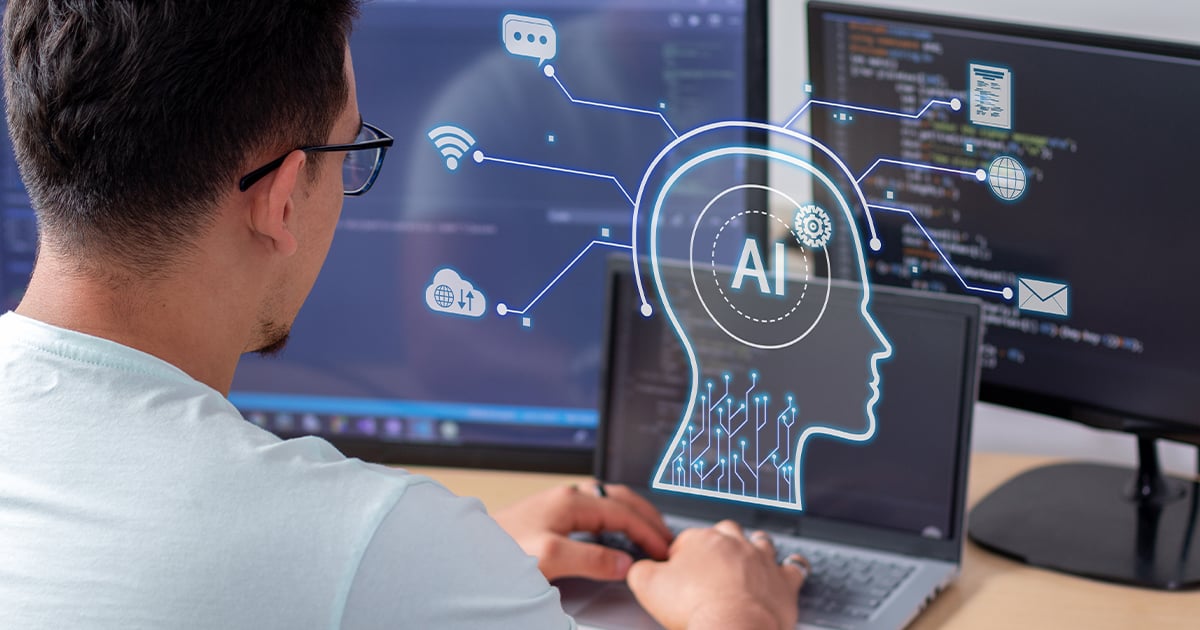Predictive intelligence is a branch of AI that uses patterns to predict outcomes and decide on learned information. Predictive intelligence, rather than simply responding to commands, enables computers to anticipate users’ needs and perform tasks proactively.
Examining data, identifying patterns, and making autonomous decisions help your PC become a smart assistant, making tasks easier and more efficient.
As AI-powered PCs become more capable of independent action, predictive intelligence transforms how people interact with technology, offering benefits like streamlined workflows, improved security, and personalized experiences.
Let’s explore the key concepts behind AI and predictive intelligence and the practical ways predictive intelligence enhances PC functionality:
How Predictive Intelligence Works
- Collecting Data
Predictive intelligence starts with data collection, gathering information about user actions, preferences, and routines. This data might include browsing habits, frequently accessed files, and app usage patterns. By amassing this information, AI creates a database of behaviors that helps it understand user needs.
- Identifying Patterns
After collecting enough data, AI detects recurring patterns. These patterns form the foundation for predictive actions. For example, if a user checks their email at the same time daily, the AI will recognize this as a pattern and may begin suggesting email applications at that time. These insights allow AI to predict what users are likely to do next.
- Making Predictions
Based on detected patterns, predictive intelligence makes predictions about user needs. This step involves real-time data processing to determine the best way to assist the user. If the AI anticipates that the user will need certain files or programs, it can bring those resources forward to simplify access.
- Autonomous Decision-Making
Predictive intelligence can also make decisions on behalf of the user. This autonomy enables it to perform repetitive tasks without specific commands, such as setting a default save location based on the user’s previous behavior or preloading a frequently accessed website. These decisions streamline routine actions and provide a smoother user experience.
Examples Of Predictive Intelligence In Daily PC Use
- Personalized Content Recommendations
Many platforms use predictive intelligence to suggest content. Based on viewing history, predictive algorithms recommend videos, articles, or music the user might enjoy. This application of predictive intelligence helps personalize content and enhance the user experience.
- Search Engine Autofill
Predictive intelligence is commonly found in search engines, which suggest search terms based on past searches and popular keywords. This feature speeds up searches by helping users find the information they need with minimal typing.
- Virtual Assistants
If a person often checks the weather in the morning, the virtual assistant may proactively update the weather at the start of each day. Predictive intelligence helps these assistants become more responsive to user needs.
How Predictive Intelligence Improves PC Functionality
Predictive intelligence offers various improvements that make PCs more helpful and efficient:
- Automation of Repetitive Tasks
By learning a user’s routine, predictive intelligence automates tasks that might require several steps. If the AI recognizes that a user frequently saves files to a particular folder, it can automatically suggest or set that folder as the default location, reducing repetitive actions.
- Enhanced Security Measures
Predictive intelligence also improves security by monitoring regular patterns and alerting users to unusual activity. If an unrecognized login attempt occurs, AI can notify the user and prompt additional security measures. This proactive security helps protect data by anticipating potential threats.
- Resource Optimization
Predictive intelligence manages PC resources by prioritizing applications that the user frequently uses. Predictive intelligence allocates resources accordingly to ensure smooth performance if a user is editing a video or working on a high-performance application.
- Efficient File Organization
Predictive intelligence assists with file organization by suggesting common save locations and sorting files based on previous habits. By anticipating how a user prefers to arrange files, AI reduces the time spent searching for documents and enhances productivity.
The Future of AI in Predictive Intelligence
The future of predictive intelligence in PCs is full of potential as AI technology becomes increasingly advanced:
- Enhanced Autonomous Decision-Making
Predictive intelligence can make even more independent decisions as it grows more sophisticated. Future PCs may manage notifications during busy periods or arrange files based on project importance without requiring user input.
- Greater Device Connectivity
Predictive intelligence may soon connect multiple devices, such as phones, tablets, and PCs, for seamless transitions between tasks. A project started on one device could be instantly accessible on another, creating a unified user experience across platforms.
- Increased Accessibility
Predictive intelligence has the potential to make technology more accessible, particularly for individuals with disabilities. Features like voice commands, automatic screen adjustments, and proactive suggestions could help create a more inclusive technology landscape.
Conclusion
AI in predictive intelligence is transforming how people interact with PCs. By analyzing patterns, predicting needs, and making autonomous decisions, predictive intelligence simplifies daily tasks, improves security, and personalizes the user experience. These advancements make using PCs more efficient, intuitive, and enjoyable.
With continued development, predictive intelligence will play an even larger role in making technology proactive, personalized, and accessible. The integration of AI in predictive intelligence has the potential to reshape our relationship with PCs, enhancing productivity and simplifying complex processes. The future of predictive intelligence in PCs promises a smarter, more responsive, and more user-centered experience.

